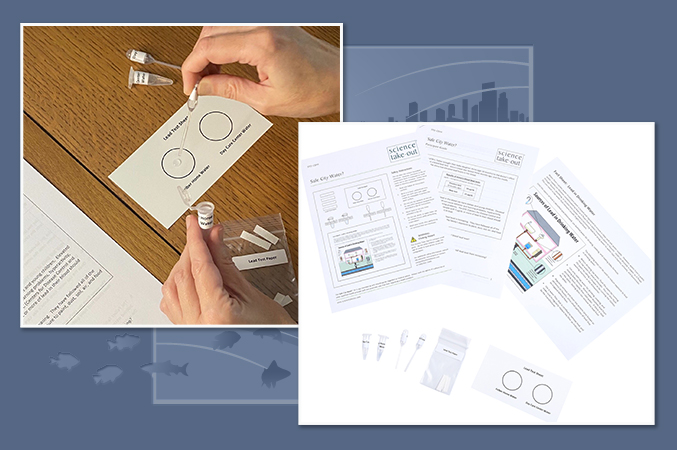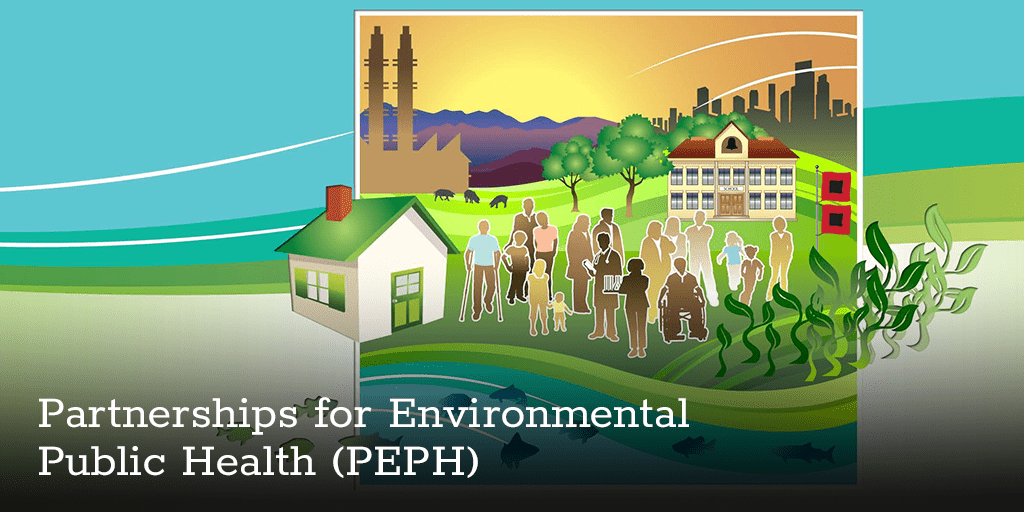Although the COVID-19 pandemic disrupted schooling, members of the NIEHS-funded Environmental Health Sciences Center’s Community Engagement Core (CEC) at the University of Rochester have been able to teach environmental health throughout the pandemic in socially distant formats by distributing hands-on science kits to remote learners.
The CEC team engaged with community partners, such as a science museum and a zoo, to reach school-aged students and other community members. Members of the CEC instructed participants, who were alone or grouped together in different locations, via remote video conferencing. Kits contained safe materials that simulated a laboratory experience. In a recent paper, CEC team members describe how this process enhances environmental health literacy and offer lessons learned for future hands-on remote instruction.
“The COVID-19 pandemic created unique challenges for traditional science education,” reflected Dina Markowitz, Ph.D., co-author and creator of the kits. “The kits provided diverse groups of students and other learners the opportunity to have a hands-on experience critical to understanding scientific concepts.”
CEC staff guide learners through kit activities in a socially distant setup. (Photo courtesy of Dina Markowitz)
Science Take-Out Kits
CEC staff used hands-on kits from Science Take-Out, an entity funded by a federal Small Business Innovation Research grant. The kits come prepackaged with items that mimic laboratory reagents and other materials for hands-on learning. Each kit teaches a science topic by simulating a real-world scenario in which students explore an environmental health problem. The CEC team prepared lessons based on two kits: Safe City Water and Are Flavored E-cigarettes Harmful?
The Safe City Water kit taught learners how the public water supply is regulated, how lead can get into tap water, and how to reduce risk of lead exposure. Lead testing requires laboratory resources that were unavailable for this remote learning experience, so the kits simulated water testing to teach learners about environmental health testing. Specifically, the kits, which contain pH buffer solutions that represent tap water samples and test papers to examine pH levels, simulate lead testing in tap water.

An individual uses the Safe City Water kit (left), which includes materials to simulate tests for lead in water, instructions, and educational materials (right). (Photos courtesy of Dina Markowitz)
The e-cigarettes kit demonstrated how flavor compounds affect lung cells. The kit contains sponges that simulate lung cells and pH buffers that represent e-cigarette flavoring. The kit is based on published research studies from the laboratory of Irfan Rahman, Ph.D., at the University of Rochester, who investigated the health effects of flavoring chemicals.
Teaching Science in Remote and Socially Distant Learning Environments
Kit-based lessons were hosted for five groups with diverse participants. The groups and their associated participants included:
- American Lung Association Reality Check youth action program for 23 high school students.
- Girl Scouts of Western New York for six children, ages 10-13.
- National Association of Biology Teachers for 34 adult science teachers.
- Rochester Museum and Science Center for 11 children, ages 9-11.
- Seneca Park Zoo Urban Ecologist Program for 12 high school students.
Although all sessions were held in formats that complied with COVID-19 safety protocols, they used different setups. The CEC team found that certain arrangements more easily facilitated learning and interaction than others.
Participants in the Rochester Museum and Science Center class attended the session in-person, following COVID-19 safety protocols, with instruction provided by a CEC instructor through Zoom. Students used their own kits at individual tables. Researchers noted difficulties with this format because they were not able to see or hear the participants who were spread throughout a large space. Due to these difficulties, CEC staff did not gather feedback from this group.
The Girl Scouts session was held in-person outdoors, and CEC instructors attended the event. Each child used her own kit. CEC instructors provided guidance and answered questions. The children participated in discussions throughout the class, further facilitating learning.
Sessions for all other groups were conducted entirely through Zoom. Each participant, including the instructors, joined the session online from separate locations. Participants discussed the topics and instructors responded to questions. Based on participant feedback, learners engaged with one another and the material just as effectively as the in-person session.
“While one session posed particularly challenging, overall, the participants were able to successfully work through the kits with the support of CEC staff,” stated Cait Fallone, M.A., lead author of the study. “We also found that discussion during the sessions was a key component that helped participants further engage with the material. We were happy to see that discussion was still rich given the remote and socially distanced learning environments. Feedback indicated that sessions were engaging and successfully provided environmental health education.”
Enhancing Environmental Health Literacy
Students who completed the Safe City Water kit stated that the kits effectively reinforced environmental health topics because of the hands-on format. They said that the kits helped them understand how lead can affect health and that they found the experience fun and engaging. The adult facilitators of student groups expressed positive feedback about the high level of engagement among the students. Feedback on the “Are Flavored E-cigarettes Harmful?” sessions was similar.
“Participants indicated that using the science kits provided an engaging, hands-on learning experience,” said Markowitz. “This kit-based format accounts for students’ unique learning environment and makes environmental health education accessible to a broad array of learners that may not have access to a lab-based experience. Students demonstrated increased environmental health literacy after these sessions.”
The CEC plans to continue engaging with researchers, educators, and community groups to host sessions with the kits. They hope to expand their reach to new audiences, particularly to learners who have limited access to traditional lab-based resources.
Katrina Korfmacher, Ph.D., co-author of the study and director of the CEC added, “I am particularly excited about new high school science kits in development related to One Health—the connections between animal health, environmental health, and human health—and about eventually adapting the kits for community-based learning.”
Source link
www.niehs.nih.gov

